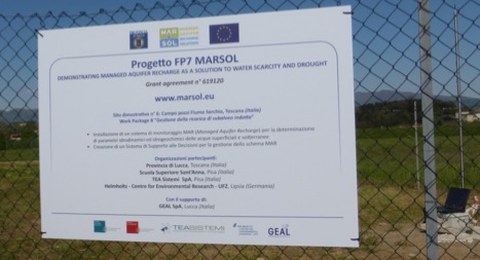23.04.2015
Workshop on numerical modeling of managed aquifer recharge schemes in Pisa, Italy

MARSOL Workshop
The joint international workshop of the two EU-Projects MARSOL and FREEWAT was held on the 21st to 23rd April 2015 at Scuola Superiore Sant´Anna in Pisa. MARSOL means “Demonstrating Managed Aquifer Recharge as a Solution to Water Scarcity and Drought” and includes 8 demonstration sites around Europe and Israel where MAR is demonstrated to increase the availability of freshwater resources under water scarcity.
On the first day various interesting presentations concerning the modeling of water resources were held by researchers mainly from Europe but also USA. The presentations covered general topics like using models in water resource management, but also specific case studies about modeling water quality changes during MAR using reactive transport models. Furthermore the EU-project FREEWAT was introduced which intends to develop “free and open source software tools for water management”. This will be realized as a plugin for QGIS and will include hydrological and hydrogeological models for flow and transport, a module for planning and water management, a module for calibration, uncertainty and sensitivity analyses and a module for crop growth.
On the second day and third day presentations regarding the ongoing modeling applications in the EU project MARSOL were held. From our team, Jana Ringleb presented the project INOWAS.
In the afternoon the participants went on a field trip to the Sant`Alessio well field and to the Massaciuccoli lake area including the San Niccolò phyto-treatment experimental field close to Pisa. The field site in Sant`Alessio along the Serchio river is one of the demonstration sites within the project MARSOL. The induced riverbank filtration (IRBF) along the river allows an abstraction of about 0.5 m³/s from ten vertical wells and provides drinking water for about 300 000 people in the coastal area of Tuscany.
The second site visited was the Massaciuccoli lake where a large part of the original lake has been reclaimed by pumping. The drained areas constitute of peat soils (organic matter>50%) and underwent subsidence (2-3 m in 70 years) due to compaction and increased mineralization of peat. Furthermore, the lake undergoes severe water stress in summer because of head decreases and nutrient input resulting in eutrophication and seawater intrusion. As a consequence, a new water management strategy for the whole basin needs to be incorporated. One part is rewetting and setting-up a phyto-treatment system to improve water quality and restore ecological functions. Different management systems with increased anthropogenic impact are tested including a constructed wetland, paludiculture and a natural wetland.
The workshop was a good opportunity to get in contact with the European MAR community and maybe it was a start for some future collaboration between the newly started FREEWAT project and our project.
